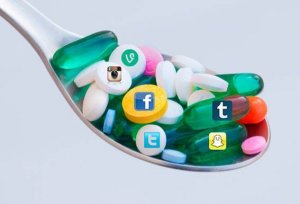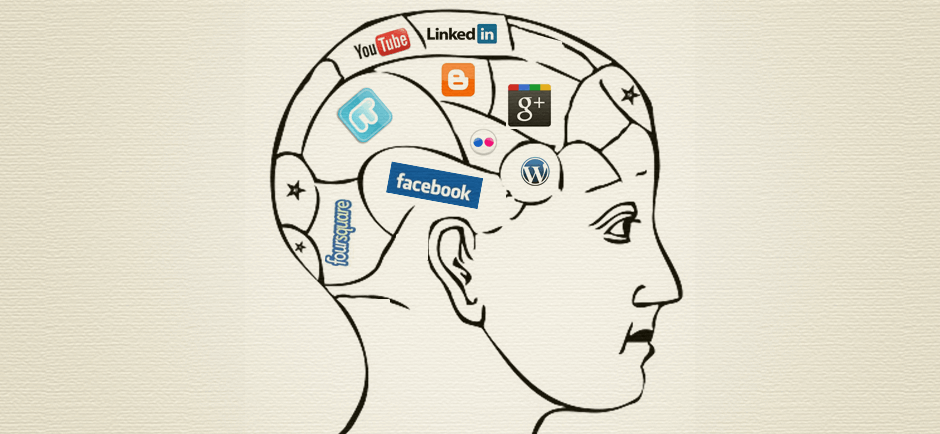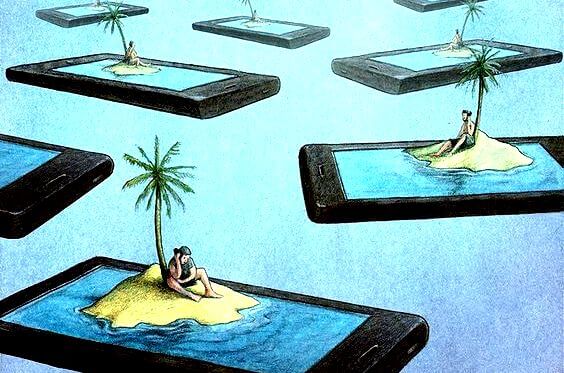When You're Addicted to Social Media


Written and verified by the psychologist Fátima Servián Franco
In fact, in 2012 behaviors associated with the internet usage were analyzed. The purpose was to consider their inclusion in the fifth edition of the DSM, the Diagnostic and Statistical Manual of Mental Disorders. The DSM-V is a reference manual for psychiatrists and psychologists in clinical practice. Ultimately, internet addiction was excluded.
Psychological addictions
The term addiction usually refers to overuse of chemical substances in the body. Thus, the excessive consumption of alcohol, tobacco, or any other type of drug fits the term “chemical addiction”. But there are also non-chemical or psychological addictions associated with things like games, food, sex, and work.

Any normal pleasurable behavior is susceptible to turning into a psychologically addictive behavior. Behavior is abnormal depending on the intensity, frequency, and degree of interference with a person’s family, social, and work relationships. In addition, the basic psychological components of addictive disorders are centered around dependence and a loss of control.
The main difference between a psychological and substance addiction is in treatment. The latter means giving up the substance in question. However, that for psychological addictions, a person does not necessarily stop the behavior.
Why? Because in order to heal from a psychological addiction, a person has to learn to control their impulses. The idea is to moderate how many hours you work if you’re addicted to work, the amount of sex if there is an addiction to sex, or the hours you spend on social media if you’re addicted to social media.
“Addiction is perhaps a disease of the spirit.”
-Osamu Dazai
Addiction to social media and its link to self-esteem
Social media like Twitter and Facebook have changed the way we interact. It influences our behavior. Everyone uses social media, whether it’s for marketing or to get in touch with old friends.
Studies have been done to see how they affect people and their self-image. The results have shown that being on social media too much contributes, on one hand, to increased stress and feelings of loneliness. On the other, it contributes to less happiness.
In fact, some studies have linked addiction to social media (like Facebook, Instagram, and Twitter) with low self-esteem. The results are supported by symptoms of depression and a lack of social skills in social media users.
The reason is because of the posts we see about other people’s lives. The addicted person is constantly comparing themselves with others. They end up thinking that their own life is boring, miserable, and empty. They don’t realize they’re wasting time they could be using to live their own life to the fullest.
A fake life to disguise crippling self-esteem
In order to impress others, people create a whole fake life — just to get likes and comments. Despite the intense but brief pleasure a person feels when they post something, it doesn’t do anything good for their self-esteem. Instead, it may turn them into slaves of other people’s opinions and judgments.

A lot of times people only post happy things on social media. But it’s a mask. In the end, an addiction to social networks is a sign that you have a need that isn’t being satisfied. A hole that you’re patching up by logging into Facebook and posting about your fake life.
Now, social media is not bad or dangerous, but how we use them could be very harmful. That’s why it’s so important to look at how important they’ve become in our lives. Things we get from outside us will never produce the happiness that we really want and need. Authentic happiness only comes from within.
In fact, in 2012 behaviors associated with the internet usage were analyzed. The purpose was to consider their inclusion in the fifth edition of the DSM, the Diagnostic and Statistical Manual of Mental Disorders. The DSM-V is a reference manual for psychiatrists and psychologists in clinical practice. Ultimately, internet addiction was excluded.
Psychological addictions
The term addiction usually refers to overuse of chemical substances in the body. Thus, the excessive consumption of alcohol, tobacco, or any other type of drug fits the term “chemical addiction”. But there are also non-chemical or psychological addictions associated with things like games, food, sex, and work.

Any normal pleasurable behavior is susceptible to turning into a psychologically addictive behavior. Behavior is abnormal depending on the intensity, frequency, and degree of interference with a person’s family, social, and work relationships. In addition, the basic psychological components of addictive disorders are centered around dependence and a loss of control.
The main difference between a psychological and substance addiction is in treatment. The latter means giving up the substance in question. However, that for psychological addictions, a person does not necessarily stop the behavior.
Why? Because in order to heal from a psychological addiction, a person has to learn to control their impulses. The idea is to moderate how many hours you work if you’re addicted to work, the amount of sex if there is an addiction to sex, or the hours you spend on social media if you’re addicted to social media.
“Addiction is perhaps a disease of the spirit.”
-Osamu Dazai
Addiction to social media and its link to self-esteem
Social media like Twitter and Facebook have changed the way we interact. It influences our behavior. Everyone uses social media, whether it’s for marketing or to get in touch with old friends.
Studies have been done to see how they affect people and their self-image. The results have shown that being on social media too much contributes, on one hand, to increased stress and feelings of loneliness. On the other, it contributes to less happiness.
In fact, some studies have linked addiction to social media (like Facebook, Instagram, and Twitter) with low self-esteem. The results are supported by symptoms of depression and a lack of social skills in social media users.
The reason is because of the posts we see about other people’s lives. The addicted person is constantly comparing themselves with others. They end up thinking that their own life is boring, miserable, and empty. They don’t realize they’re wasting time they could be using to live their own life to the fullest.
A fake life to disguise crippling self-esteem
In order to impress others, people create a whole fake life — just to get likes and comments. Despite the intense but brief pleasure a person feels when they post something, it doesn’t do anything good for their self-esteem. Instead, it may turn them into slaves of other people’s opinions and judgments.

A lot of times people only post happy things on social media. But it’s a mask. In the end, an addiction to social networks is a sign that you have a need that isn’t being satisfied. A hole that you’re patching up by logging into Facebook and posting about your fake life.
Now, social media is not bad or dangerous, but how we use them could be very harmful. That’s why it’s so important to look at how important they’ve become in our lives. Things we get from outside us will never produce the happiness that we really want and need. Authentic happiness only comes from within.
All cited sources were thoroughly reviewed by our team to ensure their quality, reliability, currency, and validity. The bibliography of this article was considered reliable and of academic or scientific accuracy.
- Błachnio, A., & Przepiorka, A. (2016). Personality and positive orientation in Internet and Facebook addiction. An empirical report from Poland. Computers in Human Behavior, 59, 230-236. https://www.sciencedirect.com/science/article/abs/pii/S074756321630070X
- Brand, V. A. G., & García, L. E. G. (2023). Adicción o uso problemático de las redes sociales online en la población adolescente. Una revisión sistemática. Psicoespacios, 17(31), 1-22. https://revistas.iue.edu.co/index.php/Psicoespacios/article/view/1511
- Global Web Index. (2022). Digital 2022. Informe global. DataReportal https://datareportal.com/reports/digital-2022-global-overview-report
- Jasso Medrano, J. L., López Rosales, F., & Díaz Loving, R. (2017). Conducta adictiva a las redes sociales y su relación con el uso problemático del móvil. Acta de investigación psicológica, 7(3), 2832-2838. https://www.revista-psicologia.unam.mx/revista_aip/index.php/aip/article/view/46#:~:text=Se%20realiz%C3%B3%20el%20an%C3%A1lisis%20donde%20se%20encontr%C3%B3%20una,se%20relacion%C3%B3%20con%20el%20uso%20del%20tel%C3%A9fono%20m%C3%B3vil.
- Lambert, J., Barnstable, G., Minter, E., Cooper, J., & McEwan, D. (2022). Taking a one-week break from social media improves well-being, depression, and anxiety: a randomized controlled trial. Cyberpsychology, Behavior and Social Networking, 25(5). https://www.liebertpub.com/doi/10.1089/cyber.2021.0324
- Puertas, D. G. (2020). Influencia del uso de Instagram sobre la conducta alimentaria y trastornos emocionales. Revisión sistemática. Revista española de comunicación en salud, 11(2), 244-254. https://e-revistas.uc3m.es/index.php/RECS/article/view/5223
This text is provided for informational purposes only and does not replace consultation with a professional. If in doubt, consult your specialist.







